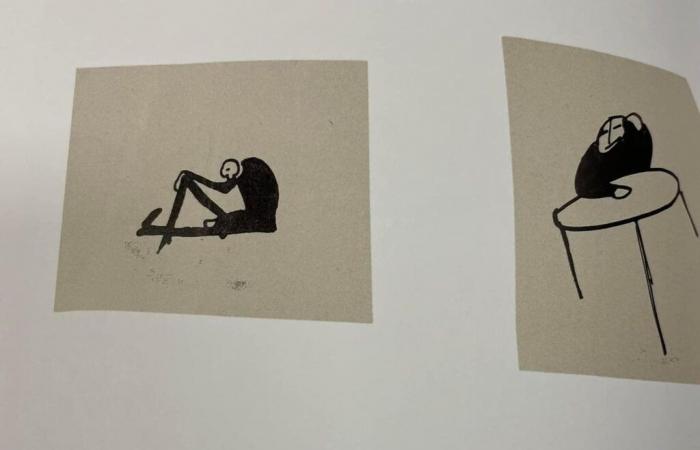“Dearest Max,
My last wish: everything that is in the possessions that I leave behind me (i.e. in my library, in my cupboard, on my desk, at home and at work, or in any other place that comes to mind mind where there could be something), whether newspapers, manuscripts, letters, mine and others, drawings, etc. must be completely burned without being read, as well as all texts and all drawings, which you or any other person who you will have to ask for them in my name, can hold.
Sound Franz Kafka »
…
Max Brod had read and reread this letter.
No, he would not respect his friend's last wishes.
All the manuscripts he could collect were in this old leather suitcase, packed to the brim on his bed in a dingy hotel in Prague.
The Nazis were at the gates of Czechoslovakia, it was only a matter of hours before they invaded that country. He was not going to make their task easier and participate in the burning of the work of a brilliant writer, who one day would be recognized by the whole world.
He had a train ticket to Constantinople. The train was leaving in 2 hours.
From there he planned to go to Jerusalem, where the publisher Salman Schocken was waiting for him, who had also escaped from Berlin and managed to set up a publishing house again.
Schocken had promised Max Brod to publish Kafka.
There remained the problem of the drawings.
Kafka liked them even less than his writings and found them worthless.
Max Brod was a connoisseur and had started collecting paintings by contemporary German artists. But his friend's drawings were the opposite of expressionism. No colors or tortured shapes. Sticks, broken figures, a calligraphy of solitude.
Sober like isolated letters, which question the reader.
A minimalism of despair.
These drawings were everything that Kafka had failed to express in words.
Max Brod had made his decision.
He removed the bulky rail traffic guide from his bag. He wouldn't need it anymore anyway. He would never return to Europe, a continent that no longer wanted its Jews.
Instead he put a large envelope which contained the drawings of Franz Kafka.
…
On the train to Constantinople, Max Brod closed his eyes, his head full of the noise of the axles and the boots of the barbarians who had crossed the borders of Czechoslovakia.
Soon his friend would be safe.
Max Brod already imagined himself in a shady apartment in the Rehavia district of Jerusalem, a Kafka book in hand.
…
At 23 Spinoza Street in Tel Aviv, a rather dilapidated building, with shutters still closed.
There lived an old lady with her cats. She died in 2020, after losing a years-long trial.
Her name was Eva Hoffe. His mother Esther, had been Max Brod's secretary and undoubtedly mistress.
In 1939, twenty-four hours before the Nazis closed the Czech border, Max Brod managed to escape to Palestine with his suitcase full of Kafka manuscripts, letters and photos. He had ignored his friend's injunction to destroy them after his death in 1924.
Max Brod having lost his wife and having no children, it is his secretary Esther Hoffe who will inherit these documents.
These papers will be distributed in safes in Tel Aviv and Zurich.
Some of them will stay in the apartment on rue Spinoza, among the cats.
Against Brod's wishes, Eva Hoffe quickly monetized them by illegally selling the original manuscript of the “Trial” to a German collector.
The State of Israel opposes the sale and dispersal of these priceless documents.
The writings of the Czech Jewish writer, saved at the last minute from the flames, must not return to German soil.
Kafka's work belongs to the universal heritage but Max Brod wanted the original manuscripts to be preserved in the National Library of Israel.
After years of proceedings, justice decided that these documents would remain in Israel, preserved in the National Library, accessible to all researchers.
On November 22, 2021, the last documents from Swiss safes arrived and were presented to the press in Jerusalem.
These were three versions of “Preparations for a Country Wedding”, drawings, Hebrew exercise books, numerous letters addressed to his friends, Max Brod and others…
Letters to his father whose tone would be very different from the famous “Letter to the Father”.
…
One Saturday morning, I passed rue Spinoza.
Everything was silent, the faithful were in the synagogues, the others remained in bed enjoying the Shabbat rest.
The only sound was that of my footsteps crushing the eucalyptus fruit pods.
One of the shutters of 23 rue Spinoza has opened ajar.
I thought I saw a furtive shadow, a frail silhouette, with a sharp profile bearing the outline of a satisfied smile.
Frantz Kafka had won his case.
© Daniel Sarfati






